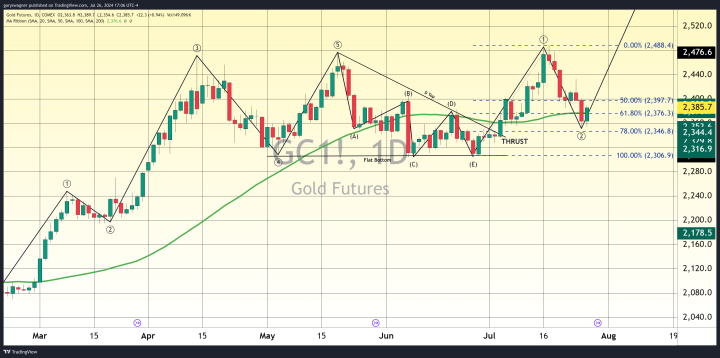
Gold Price News: Gold Hits Two-Week Low After US GDP Growth Surprises
Gold prices fell sharply on Thursday, after US GDP figures showed surprise growth in the second quarter.
Prices fell as low as $2,354 an ounce on Thursday, down from just under $2,400 an ounce in late trades on Wednesday. The latest action means gold prices have fallen to their lowest for more than two weeks — testing the lows of around $2,350 an ounce last seen on July 9.
KAU/USD 1-hourly Kinesis Exchange
US GDP figures were released on Thursday, showing that the economy grew by an annualised 2.8% in the second quarter, up from 1.4% in Q1, and well above market expectations of 2%. That’s a bearish factor for gold prices, which tend to fare worse during times of economic strength when other assets perform more positively.
The latest GDP figures appear to have had little impact on the outlook for US interest rates, with interest rate traders fully pricing in a first rate cut by the US Fed at its September 18 meeting. However, the stronger GDP numbers may indicate that the number and scale of rate cuts needed in the coming months may be lower than previously assumed, and the markets will be watching for further data to support or challenge that outlook.
Also released Thursday, US durable goods orders fell by 6.6% in June, far below the market’s expected increase of 0.3%, and this may have helped stem the day-on-day losses for safe-haven gold.
Any further price downside for gold would bring the $2,300 an ounce level into renewed focus, as this has been a key area of price support in May and June.
Looking ahead, Friday will see the release of the US core PCE price index for June – the Fed’s preferred measure of inflation – for further clues on the trajectory for interest rates, followed by the Michigan consumer sentiment figures for July, which cover the US as a whole, for a further pulse-check on the US economy. The figures have shown four consecutive monthly drops in sentiment up until June, and any further declines could help strengthen the case for more accommodative monetary policy in the US.
Tim Moseley
